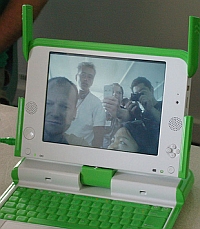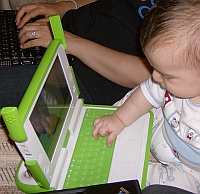If you follow One Laptop Per Child as obsessively as I do, you'll note a certain schizophrenic support for the Children's Machine XO. On one side, you have an unchecked love of the literally clock-stopping hot OLPC technology.
On the other hand, there is an uneasiness about the grand plans, great cost, and minimal testing of the OLPC implementation. Two articles in the Christian Science Monitor are a great example of the schism.
In Gregory M. Lamb's A closer look at what '$100 laptop' will be, he opens with hope around the OLPC XO's design and cost:
It's an astonishing experiment: Design a cool computer, unlike anything on the market, loaded with innovative features. Manufacture it for not much more than $100 apiece, a fraction of what other computers cost.But not three weeks earlier, the Christian Science Monitor's editorial board came at the OLPC plans from a whole other angle. In Laptops: easy fix for global education?, the Monitor's View starts by grouping OLPC with prior unsuccessful attempts:Persuade government officials in developing countries to buy millions of them, and hand them to schoolchildren. Then stand back and see if you've done what you hoped – created a revolution in the way kids learn.
For billions of parents who earn only a few dollars a day, paying for a child's education - books, etc. - often gets neglected. Many simple solutions that break that cycle of poverty have been tried and have failed. Now another one is on the horizon: a "$100 laptop."The editorial carries that cautionary tone through the article with a sobering end:
Easy fixes in education are often alluring. Such projects as the $100 laptop should be treated with both open eyes and open hearts. Global solutions require that an experiment be able to be replicated across many cultures.How can OLPC commentary, especially from the esteemed Monitor be so schizophrenic? I was troubled by this duality of OLPC commentary until I read Charles Dodgson's Through the Looking Glass thoughts on the whole idea of revolutionizing education with a laptop:
[C]onsidered solely as a laptop project (and not the "education project" that Negroponte wants it to be instead), the [Children's Machine XO] is brilliant. There are multiple major technical breakthroughs in this machine.While I sincerely hope One Laptop Per Child doesn't become a boondoggle - the future of technology in the developing world is at stake - so far I have to agree with Mr. Dogson and the Monitor's schizophrenia.But what we have here is actually two projects, not one: a brilliant technology project for developing a cheap, low-power laptop, and a proposal for a government project in the third world using that laptop.
And while there are things that I think government does better than anything else (like health care), this particular proposed government project is, so far, shaping up as the kind of starry-eyed, Utopian boondoggle that makes libertarianism look good.
Nicholas Negroponte has already revolutionized laptop design. The dual-mode screen, Sugar/Linux operating system, and yo-yo power will upended the world's computer industry in a good way. But to anchor a $30 Billion dollar educational revolution in a thing - any "thing" deployed by inefficient governments - and not teacher-led learning, successful since Aristotle, is a risky gamble with millions of children's futures.




It's pretty obvious to anyone who wants to be truly objective, that Negroponte's idea is a farfetched and no-so-naive one.
Farfetched because the mere idea that throwing an un-proven (in every sense!) device at kids will somehow result in them getting a better education is stuff for deranged minds.
No-so-naive because Negroponte, with his continued dismissal of pertinent questions and his insistence that the laptops be sold to third world countries, has shown that he realizes his propossal would never stand a chance in a more organized society (his own USA) where he would be forced to answer all the questions he won't get from his ignorant third world customers.
Negroponte's actions are predatorial and ultimately very sad, because they will ultimately victimize those most vulnerable: the poor.
From Dodgson's post:
"So, I don't like the grand vision, at least not the way it's being pursued. Does that mean I don't like the project? Those little boxes are amazingly seductive. If the deployment model is all wrong, fix that. Construct a sales organization which can handle orders of less than a million a pop, accept the inevitable markup, and sell the damn things. If they're good for anything at all, the folks in the third world will very quickly figure out what, as they did with cell phones. They'll probably come up with uses that first-worlders would utterly fail to anticipate. (And in the context of OLPC, it's worth noting how most of the cell-phone users described in those articles first saw them as adults. One of the most annoying symptoms of OLPC KoolAid Poisoning is a firm, nearly psychotic conviction that children and only children will readily adapt to any new tech toys you give them."
I don't know if selling it is the best approach, but it is quite certain that the villagers will figure out hundreds of uses, many of them financially renumerative. I think Negroponte misses this because he is so focused on education.
By the way, I thought of another educational use. In developing countries often half or more of the children in a family are kept out of school to work in the fields. But with oplc they could use a sibling's machine after dark to educate themselves.
I'm not quite sure how "the future of technology in the developing world is at stake" or it is a "risky gamble with millions of children's futures."
At worst, it will be a very expensive dud, which turns into a government hand-out to all families with children which either sell the laptop or use it for their own house-hold purposes.
Second worst, it will serve the minimal purpose of replacing paper text-book costs over 2-5 years.
Even the third worst scenario would be that the olpc helps intensify educational outcomes provided by the pre-existing teachers available to the children.
Under what circumstances would the olpc actually set back technology in the developing world or put children at mortal risk?
As a footnote to the footnote, in the original post, the passage that Eduardo quoted above includes a link to accounts of third-world cell phone usage, which explains the articles referred to in parens; the URL, which continues to be updated, is here:
http://www.textually.org/textually/archives/cat_mobile_phone_projects_third_world.htm
(Also, if anyone can't figure it out, this is a pseudonym...)
The cell phone article says, "raising wireless penetration by 10 percentage points can lead to an increase in gross domestic product of about 0.5 percent, or around $12 billion for an economy the size of China"
If oplc can handle voip, then it would be an alternative to the cell phone and provide similar benefits, though perhaps at a smaller level since the oplc would in in the classroom during weekdays and so unavailable for adults to use.
Troy, the USA is so far the only place where giving each child a laptop has been tried. Of course, when you spend over $10,000 per child per year in public education the difference between a $150 laptop and a $700 iBook from Apple is not significant, so they have been distributing the latter.
http://www.mainelearns.org/
http://www.apple.com/education/k12/onetoone/
Well it feels like once again, media is mistaking the laptop as the ultimate solution to education revolution.
In order to implement efficiently the tech supported revolution, whereas we are talking of the laptop or a million mutant teaching monkeys from outer space. technology is just a tool to leverage the learning process. Hence in order to effectively use the technology governments will have to include technology in the overall education strategy.
Sadly most third world governments as troy states, are still un-saavy, and prompt to make such mistakes. and tend to think of technology alone as ultimate answer to their problems.
Just take a look at (Mexico's) enciclomedia and e-mexico ( http://www.emexico.gob.mx/wb2/eMex/eMex_eLearning )
in which government fell for a technology bases honeymoon just to wake up after a government period to see it was just a waste of time and money.
I believe in olpc project, I'm just worried that governments will again invest a lot of money to buy tech which they have no clue how to implement.
I have been an IT Specialist for 3 decades. Technology is not a 1 size fits ALL scenario. The machine is only as good as the person using it! If a people does not have the most basic elements for life - clean air, water, food and shelter a computer is not the answer to solve these problems. The next real question is - "How do you get the infrastructure and teachers to make this technology work?" I am also appalled @ the quote "If you look at the cost of doing one laptop per every Nigerian child it actually turns out to be 73% of the entire Nigerian budget — that's not the educational part but the entire national budget of Nigeria," Vota said." Nigeria is an oil producing nation but; I can guarantee that the "National Budget" is not reflective of the income from it's natural resources. I agree with the comment that this first be tried in America! We have lots of poverty right @ home and we have an infrastructure that can accommodate this technology.